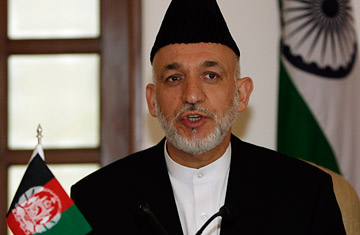
Afghan President Hamid Karzai speaks to the media after meeting with Indian Prime Minister Manmohan Singh in New Delhi
Afghan President Hamid Karzai's heavily trumpeted peace jirga — a proposed grand assembly meant to build national consensus toward a path of reconciliation with the Taliban — has been delayed for a second time, from a start date of late this week to June 2. The National Consultative Peace Jirga Preparation Commission says the delay merely accounts for logistics — that not all of the attending delegates would have been able to make it on time.
But others say that regardless of the reason, multiple postponements and the government's failure to articulate a clear plan for the meeting have caused the traditional Afghan assembly to lose momentum and that by this point, it's unlikely to yield much of anything. "I would be very interested to see what the outcome of the jirga will be, or if there will even be an outcome at all," says a high-ranking European diplomat.
The three-day jirga has already been subject to criticisms ranging from a lack of legitimacy — jirgas are a traditional Afghan legal practice but are not governed by Afghan law — to accusations of being a political stunt by Karzai ahead of July's Kabul Conference, when Afghanistan's international partners are scheduled to discuss the country's future. The latest delay only reflects the government's continued lack of organization, says Haroun Mir, a former researcher at the Afghan Center for Research and Policy and a candidate in the upcoming parliamentary elections. "But it [is] also because the government does not have a specific plan," he adds. "How can you — in three days — reach a consensus on something that is very complicated?"
According to the jirga's preparatory commission, an estimated 1,600 delegates — 20% of whom are women — are expected to attend. They include members of parliament, tribal elders, religious authorities and representatives of every district. But there is no clear-cut approach to national reconciliation in this war-ravaged country, where military and civilian deaths are on the rise. One of the main local criticisms of Karzai's latest effort is that it focuses on rallying Afghans to a cause that many people — even government officials — believe is far more regional than national. "Certainly everyone will say they would love to start negotiating with the Taliban," predicts Mir. "But the problem is how Karzai will implement it ... Karzai cannot negotiate with Taliban without engaging Pakistan in the process."
In January, Karzai was enraged by Pakistan's arrest of a top Taliban commander, Mullah Abdul Ghani Baradar, with whom Karzai was said to be engaging in secret talks and who some say would have been key to any forthcoming negotiations. This week Afghanistan's intelligence agency accused Pakistan of playing a role in a Kabul car bombing last week that killed 18 people, including six NATO troops. "If the foreigners want peace, they can bring it in one month," says Kandahar native Haji Shamsolah, owner of a construction company, referring to Pakistan, Iran and the U.S.
But even if the jirga does yield a consensus on how to negotiate with the Taliban, a reasonable question is: Then what? Despite popular sentiment in Afghanistan, few in the international community have embraced Karzai's desire to launch negotiations with the Taliban, and the Obama Administration has maintained that any overture at this point would be premature; the Taliban must be weakened first.
In the Taliban's spiritual homeland of Kandahar, where the next major NATO offensive is already under way, that goal still seems a long way off. And NATO commanders are already downplaying their expectations for an offensive that recently has come to be characterized as more of a slow process than a military assault like the February operation in Marjah. "There is no specific D-Day for this," says British Navy Lieut. Commander Iain Baxter at NATO's International Security Assistance Force headquarters in Kabul. "It's all about connecting the people to the government and the government to the people."
Others say the softer tone is a reflection of failure in Marjah, in neighboring Helmand province, where the U.S.-led offensive has yet to rout the Taliban from the area. "They know that if they do that kind of big operation and they can't secure the area, it will create problems later on," says Shamsolah of his hometown, Kandahar. That apprehension has carried over, in some instances, to the jirga. Earlier this week, gunmen killed a popular northern tribal leader who had defied the Taliban by planning to attend the meeting.
But few in Kabul seem optimistic about any potential results of the jirga. And most civilians and low-ranking government bureaucrats interviewed by TIME this week admitted that they were not aware of the jirga's actual purpose — if one would even occur. "It's not important; it's just bulls___," says Mohamed Azim, a former NATO interpreter who quit his job in frustration with what he saw as a lack of progress. "It's all extra expenses to show the people that they are working and thinking about the people. Go make schools with that money. Give it to the poor people."
"It has been eight years, and lots of jirgas have happened with no results," says Shah Mahmoud, a security guard who fled his home in Wardak province two months ago, for fear of Taliban harassment. Mahmoud is not opposed to negotiations with the Taliban but says the government and foreign powers have dragged their feet on a resolution. Says he: "Whatever positive step is needed, they should take it."
